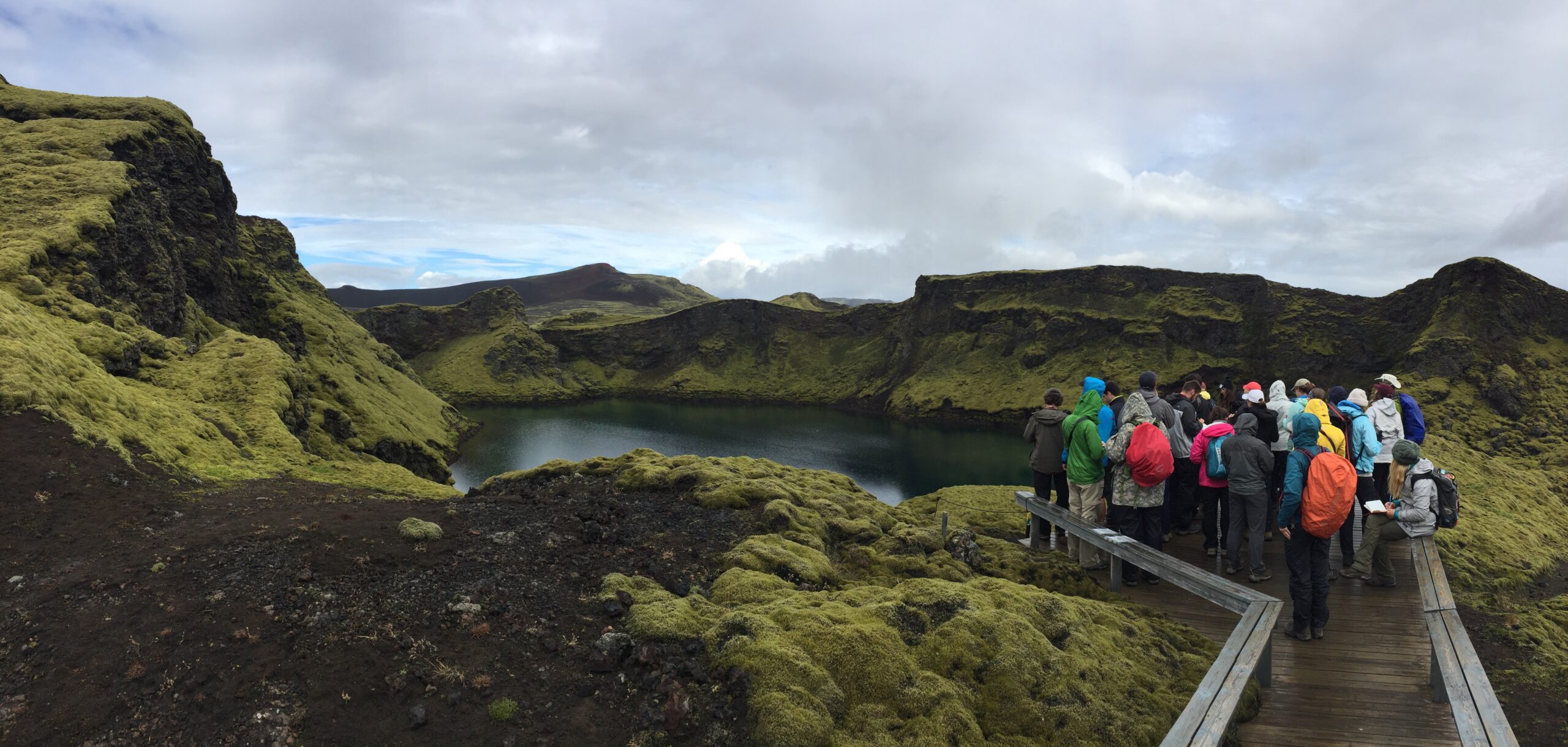The Benefits of Field Study

Lafayette students studying a landscape in central Iceland.
Taking a class outside of the classroom can enhance the learning outcomes of any course by showcasing course content as it exists in the world. In many ways, these learning experiences can answer questions like “how does this apply to me and others?” and “ what does this look like in real life?” As students engage with class concepts beyond the four walls of the classroom, they often experiment more confidently with applying different learning processes and as a result become active observers and researchers in their own right (Hole, 2018; Short et al., 2017).
While nuancing content is often a central component of getting students outside of the classroom, there are other benefits as well. For example, experiences that introduce students to the industries connected to their disciplines can motivate them to stick with their respective field and persist through difficult college coursework. This is especially true for engineering students who are getting acquainted with the subject for the first time (Nguyen et al., 2018).
There is also a relational aspect to outside learning experiences as it gives students and instructors an opportunity to interact in more informal and meaningful ways. From the bus ride there to the bus ride home, students and instructors can enhance their interpersonal and team-building skills. Taking the class out in variable environments fosters a learning model where everyone has to contribute and different student strengths rise to the surface and benefit the group in dynamic ways (Hole, 2018; Holton, 2017; Larsen et al., 2017).
On a broader level, learning experiences outside of the classroom can act as interdisciplinary sites of engagement where students are encouraged to use knowledge from different classes and integrate it into their analysis of what is going on around them. The experience outside of the classroom allows for students to think critically about, for example, resources and sustainability, power and privilege, and complex societal issues as they surface in real-world contexts and interactions. Because of this, immersive experiences can challenge stereotypes and assumptions that students might hold and encourage them to become more self-reflexive learners (Short et al., 2017; Rone, 2008; Das, 2015).
Field study is experiential, with the associated values and challenges that experiential learning carries with it (Kolb, 1984; Kolb & Kolb, 2005). What many studies have shown is that field study has benefits in both the cognitive domain and the affective domain. That is, that field study usually increases learning outcomes concerning the course material itself, as well as having a positive impact on the student’s perception of the learning experience (Boyle et al. 2007).
Students report these too, many with an appreciation, even an excitement, that was instilled by the experience in field study. Although students want to know what is in-store for them prior to the field study, many also want to be surprised by a new vantage point that comes from the time out of the classroom and express a desire for instructors to maintain an “exploratory” air to the excursion. In other words, they suggest that they be challenged for self-discovery, noting that some amount of unplanned time can go a long way toward achieving the learning goals of a field excursion.
View a recording of a panel discussion in Fall of 2020 with student perspectives of what field trips in their Lafayette College experience have meant to them, and what advice they have for instructors in creating field experiences in courses.
References
Boyle, A. et al. (2007) Fieldwork is Good: The Student Perception and the Affective Domain. Journal of Geography in Higher Education, 31(2), 299-317.
Das, S. (2015). Using Museum Exhibits: An Innovation in Experiential Learning. College Teaching, 63(2), 72-82.
Eitel, D. (2020) The Merits of Adding Field Trips to College Courses. Journal for Research and Practice in College Teaching, 5(1), 86-108.
Gomez-Lanier, L. (2017) The Experiential Learning Impact of International and Domestic Study Tours: Class Excursions That Are More Than Field Trips. International Journal of Teaching and Learning in Higher Education, 29(1), 129-144.
Hole, T.N. (2018). Working and Learning in a Field Excursion. Cell Biology Education— Life Sciences Education, 17(2), 1-11.
Holton, M. (2017). ‘It Was Amazing to See Our Projects Come to Life!’ Developing Affective Learning During Geography Fieldwork through Tropophilia. Journal of Geography in Higher Education, 41(2), 198-212.
Kolb, D. (1984) Experiential Learning: Experience as the Source of Learning and Development. Englewood Cliffs: NJ: Prentice Hall.
Kolb, A., Kolb, D. (2005) Learning Styles and Learning Spaces: Enhancing Experiential Learning in Higher Education. Academy of Management Learning and Education. 4, 193- 212.
Larsen, C., Walsh, C., Almond, N., Myers, C. (2017). The ‘Real Value’ of Field Trips in the Early Weeks of Higher Education: The Student Perspective. Educational Studies, 43 (1), 110-121.
Lonergan, N., Andresen, L. (1988) Field Based Education: Some Theoretical Considerations. Higher Education Research and Development, 7, 63-77.
Nguyen, V.H., Nguyen, H.H. (2018). The Effectiveness of the Industrial Field Trip in Introduction to Engineering: A Case Study at Hung Yen University of Technology and Education, Vietnam. International Journal of Electrical Engineering Education, 55(3), 273-289.
Rone, T.R. (2008). Culture from the Outside in and the Inside Out: Experiential Education and the Continuum of Theory, Practice and Policy. College Teaching, 56 (4), 237-246.
Short, F., Lloyd, T. (2017). Taking the Student to the World: Teaching Sensitive Issues Using Field Trips. Psychology Teaching Review, 23(1), 49-55.